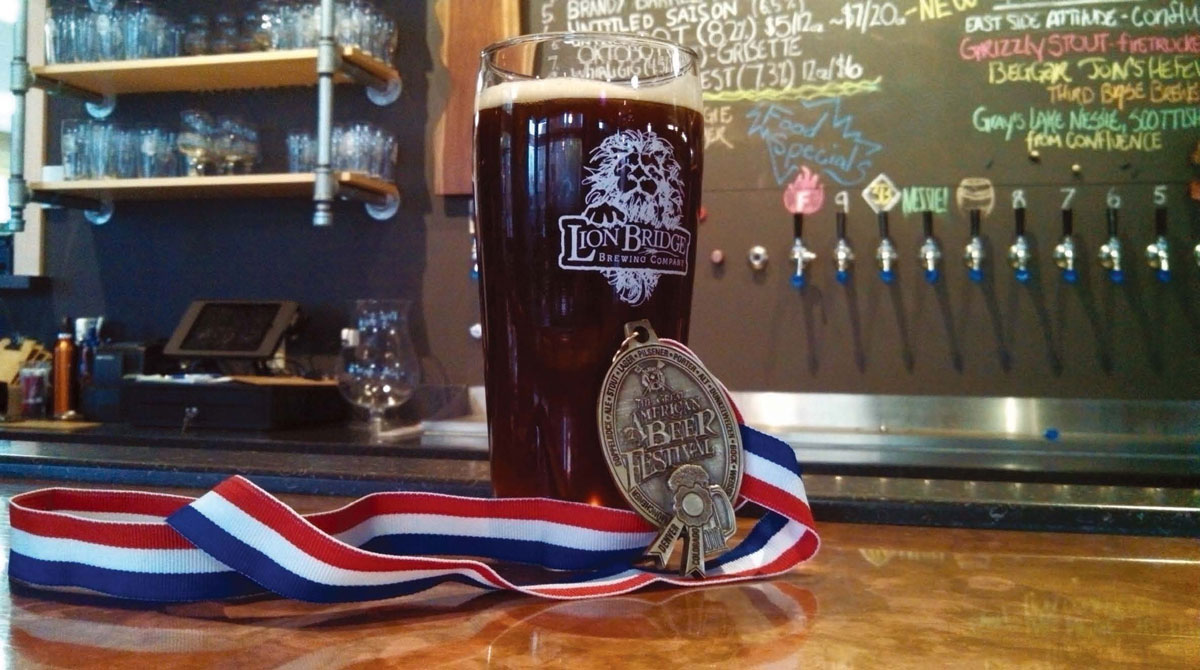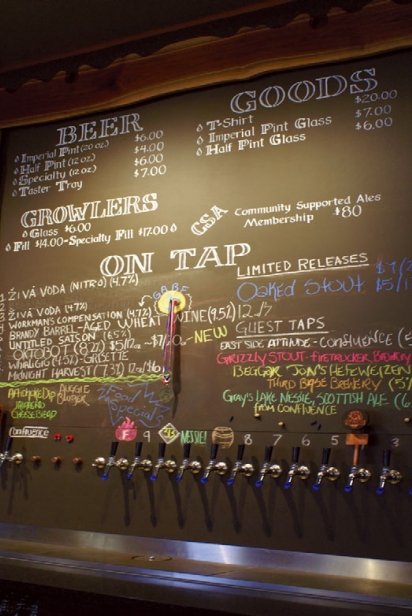Striking Gold in Cedar Rapids at Lion Bridge Brewery
Quinton McClain loves a good story. “As an English major, I always latched onto the stories behind beer and beer styles,” says the brewer and co-owner of Lion Bridge Brewery. “I love hearing about the history behind a beer style. What inspired it? Where did it start? Where does it fit in the historical context of fermented beverages?”
McClain has been hard at work creating his own story at his Cedar Rapids brewery, but even he would admit that the story of Lion Bridge’s first year is a little improbable. In roughly one year, McClain acquired an historic building in his hometown, began brewing and selling his own beer, and, oh, yes, won a gold medal at the prestigious Great American Beer Festival in Denver, Colorado. Just the way any brewer would plan it, right?
“I’ve barely had time to sit back and enjoy the fact that I have my own brewery,” says McClain, “so hearing my name called for a gold medal was nothing short of surreal. I definitely was on cloud 9 for that day, but after I got back home, it was right back to cleaning kegs and brewing beer.”
McClain is justifiably proud of what he’s started in Cedar Rapids. Lion Bridge occupies an old grocery store on the edge of the Czech Village neighborhood, just across the Cedar River from the New Bohemia neighborhood (the brewery takes its name from the 16th Avenue bridge that connects Czech Village with New Bohemia). For many years, the building housed a local grocery store and is on the National Register of Historic Places as a “contributing structure” to the historic neighborhood.
“It was important for me to locate downtown and contribute to the development of the area,” he says. “A vibrant downtown is critical to a city, and to be in this great old building is incredible.”
McClain and his partner, Deb Kaiser, who handles the food menu at the brewery’s tap room, believe in creating a community experience at the tap room. “I’ve always felt that this should be a community space that can host eclectic events,” says McClain. The tap room frequently hosts live music and poetry readings, and Lion Bridge hopes to screen movies as well.
Kaiser serves up a small menu of sandwiches and appetizers, supplemented by the occasional special themed meals or beer pairings with cheese or sausage. “We work a lot with the Sausage Foundry, another new Cedar Rapids business,” says McClain. “We also encourage our customers to patronize the other restaurants in the neighborhood.”
McClain has been interested in brewing beer since he went off to attend Colorado State University in 2001. “I was astounded by the brewing culture there,” says McClain.
After a stint at Fort Collins brewing, McClain jumped the opportunity to return to his hometown to open up his own place.
The philosophy of Lion Bridge is to focus on accessible, session beers that are still interesting. “The more beer drink, the more I realize I usually don’t want a high-alcohol beer,” says McClain. “I like to be able to sit down with a pint and really take the time to enjoy a beer. There’s a danger in giving off the perception that the best beer is something with a really strong, intense flavor. Brashness can be cool and exciting, but I think the pendulum is swinging back now to session beers. In my mind, the best beers are those that serve as catalysts to bring people together over the course of an evening.”
McClain always intended his gold-medal winning Workman’s Compensation, an English-style mild ale, to be the brewery’s flagship beer. “I liked and wanted to brew a low-alcohol session beer,” says McClain. “The style has a great romantic history. chose the name to evoke something English, and also suggest that the beer could be a reward for a hard day’s work—the perfect pint to have with friends at the pub.” Although the beer is dark in color, it is a very mellow-tasting, smooth beer that can allow one to enjoy several pints over the course of an afternoon or evening.
“A lot of our customers tell me they don’t normally like dark beer but they like Workman’s Compensation,” notes McClain. “Since it won the gold medal, the sales of that beer have increased, but the award also has stimulated interest in our other beers.”
And Lion Bridge is no one-trick pony—the brewery’s tap menu generally features nine or ten house beers, along with a handful of guest taps from other Iowa brewers. Given its Czech Village location, it’s logical that the second flagship beer at Lion Bridge is a Bohemian-style pilsner, Živá Voda (the name means “living water” in Czech). “I was looking for a Czech word that could be pronounced easily in English,” explains McClain. “I entered it in the Great American Beer Festival, although it really doesn’t fit the Bohemian pilsner style exactly. I’ll be curious to read what kind of comments the judges gave it.”
The Živá Voda may not be a true pilsner (it is not fermented at colder, lager temperatures), but the flavor certainly suggests a pilsner with its dry, spicy hop character, enhanced by a healthy dose of Saaz hops from the Czech Republic. Fans of the German kölsch style will also feel perfectly content quaffing a pint of this pils.
While the two flagship beers evoke classic European styles, some of the other Lion Bridge brews turn to more obscure sources for their inspiration.
A noteworthy example is Whirligig, modeled after a near-extinct Belgian style of beer called grisette. “I read some descriptions of the style in Phil Markowski’s book, Farmhouse Ales,” says McClain. “It’s a style that was popular among Belgian miners in the 19th Century. When the mines closed, so did the grisette breweries, and the style faded from memory.”
Since so few current examples exist, McClain was free to interpret the style in his own way. His version is a dry-hopped saison with forty percent wheat. The result is a beer that is low in alcohol, yet highly hopped with an earthy, herbal quality. It is easy to imagine Whirligig as a refreshing libation to enjoy after a hard day of physical work, whether in a Belgian mine or on a suburban lawn. Lion Bridge also offers a standard Belgian-style saison. “I may try to do some variations of the current recipe using different spices and herbs, so for now we just call it Untitled Saison until we arrive a final recipe.”
One such variation is the Midnight Harvest, a dark saison. McClain supplements the grain bill of this beer with 25 Pounds of piloncillo sugar (an unrefined dark sugar often associated with Mexican cuisine). The dark sugar contributes a molasses character, or even a hint of burnt chocolate. Some tasters might even detect a hint of coffee in this smooth, dark beer.
“That’s the fun of having the tap room at the brewery,” says McClain. “I can make a small batch of something relatively experimental and if people like it, great. If they don’t—well, I guess I’ll never brew that again.”
During our autumn visit, we had the opportunity to enjoy one of the more unusual Oktoberfest beers we’ve tried. The Octobot was brewed for the “Czechtoberfest” celebration in Cedar Rapids. The name makes a play on the Czech-German amalgamation, with “Octo” from Oktoberfest and “bot” from robot, the Czech word for worker. Far from the standard märzen-style Oktoberfest, Octobot is dark, with a deep reddish hue and a hearty malt flavor combined with a chocolate and toffee notes. The richness of the Octobot should be enhanced when Lion Bridge releases a barrel-aged version, which McClain hopes to roll out at the tap room in January.
Another distinctive brew we sampled was the Brandy Barrel Wheat, which benefited from a few months in Cedar Ridge brandy barrels. “My goal was to make a barrel-aged beer that was still relatively light in color,” says McClain. “The base beer was approximately 9.5% alcohol and the brandy definitely gives it an extra ‘boozy’ kick.” The aroma of the Brandy Barrel Wheat is so intoxicating that you may not get around to tipping your glass, but we recommend you do. You’ll be rewarded with a smooth, almost sherry-like beer.
“My preference is for the sessionable beers,” says McClain, “but sometimes it is fun to make a high-alcohol beer. I like to make sure we have something available for everyone.”
“One thing we don’t have right now is a very hoppy beer,” notes McClain. When Lion Bridge first opened, McClain tried a couple of pale ale recipes, but was unstatisfied with the results. He is currently working on rolling out a Belgian- style IPA, and also plans another adventurous beer tinged with ginger and hibiscus.
For the foreseeable future, Lion Bridge beers will be available only on draught at the tap room and at area restaurants and bars. McClain is wary of diving into canning or bottling his beer just yet. “There’s always that loss of control with bottling,” notes McClain. “There’s always the danger of old bottles lingering on the shelf and the last thing I want is for the customer to have a bad experience.” McClain notes that packaging creates a great deal of waste and he works hard to reduce the waste stream of the brewery. Lion Bridge sends its spent grains to area farmers and even plans on fabricating tote bags out of their empty sacks of malted barley.
Don’t expect Lion Bridge to rest on their laurels. McClain looks forward to the upcoming year, with plans to continue brewing interesting beers and reintroduce customers to Cedar Rapids increasingly pedestrian- and bike-friendly neighborhoods. Swing by the Czech Village and check out Lion Bridge. We can think of no better compensation for your trouble than a fresh pint of beer.
WHEN YOU GO:
Lion Bridge Brewing Co.
59 16th Ave SW, Cedar Rapids LionBridgeBrewing.com
Hours:
Wednesday-Friday 3:00pm—10:00pm
Saturday: Noon—10:00pm
Sunday: Noon—8:00pm
Closed Monday and Tuesday






